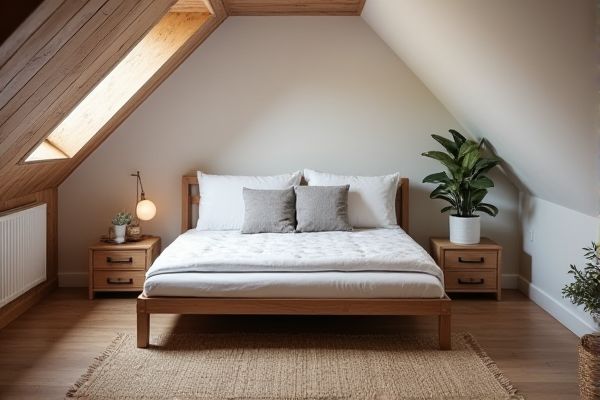
Choosing between an attic sofa bed and a futon depends on your space, comfort preferences, and style needs; attic sofa beds often offer a more traditional look with thicker cushioning, while futons provide a versatile, minimalist design that easily converts from seating to sleeping. Explore the rest of the article to discover which option best suits Your living space and lifestyle.
Table of Comparison
| Feature | Attic Sofa Bed | Futon |
|---|---|---|
| Design | Compact, often fold-out with storage options for attic spaces | Convertible sofa that folds down flat to form a bed |
| Space Efficiency | Optimized for small attic rooms and sloped ceilings | Ideal for small living spaces and multi-use rooms |
| Comfort | Typically cushioned with mattress sleepers for comfort | Firm seating and sleeping surface, varies by mattress type |
| Setup | Usually easy pull-out or fold-down mechanism | Simple folding frame, quick conversion between bed and sofa |
| Durability | Sturdy frame designed for occasional use in attic spaces | Durable but depends on frame material (wood or metal) |
| Price Range | Moderate to high, depending on custom attic fitting | Generally affordable, widely available |
Introduction to Attic Sofa Beds and Futons
Attic sofa beds offer a compact, multifunctional solution designed specifically for small spaces like attics, combining stylish seating with a hidden sleeping area. Futons provide versatility as both a couch and a bed, featuring a simple, foldable design that prioritizes ease of use and quick transformation. Understanding the differences helps you choose the ideal furniture for optimizing space without sacrificing comfort.
Space-Saving Benefits: Attic Sofa Bed vs Futon
Attic sofa beds maximize space by combining seating and sleeping functions with a sleek design ideal for compact rooms or loft spaces, offering comfortable support without bulk. Futons provide versatile, lightweight solutions that easily transition from couch to bed, making them perfect for frequent reconfiguration in small apartments. Your choice between an attic sofa bed and a futon depends on the balance between daily comfort and ease of transformation in limited living areas.
Comfort and Support Comparison
Attic sofa beds typically offer enhanced comfort through thicker cushioning and robust mattress options, providing better support for extended use compared to futons. Futons often feature a thinner mattress and a firmer frame, which can lead to less overall comfort for sleeping but act well as versatile seating. Both options vary in comfort and support based on materials like memory foam or innerspring coils, with attic sofa beds generally preferred for frequent sleepers seeking durability.
Design and Style Options
Attic sofa beds offer versatile design and style options with various upholstery choices, frame materials, and compact forms ideal for maximizing attic space. Futons provide a minimalist aesthetic, often featuring wooden or metal frames that blend seamlessly with casual or modern interiors while easily converting between sofa and bed. Your choice depends on whether you prioritize a more structured sofa look or a streamlined, multifunctional piece that fits the attic's style.
Ease of Use and Versatility
Attic sofa beds offer seamless transformation between a sofa and a bed with minimal effort, making them ideal for frequent use in small spaces. Futons provide versatility by functioning as both a seating area and a sleeping surface, though they may require more manual adjustment and space to convert. Your choice depends on the balance you need between effortless operation and multifunctional use in your living area.
Durability and Longevity
Attic sofa beds typically offer enhanced durability due to their robust frame construction and high-quality mattress materials, which can withstand regular use and provide long-term comfort. Futons, while versatile and space-saving, often feature thinner mattresses and less sturdy frames, potentially reducing their lifespan under frequent folding and unfolding. For your home, choosing an attic sofa bed ensures greater longevity and consistent support compared to a futon.
Price and Value for Money
Attic sofa beds generally offer better value for money due to their dual functionality as comfortable seating and a quality sleeping surface, often priced higher but built for durability and style. Futons, while more affordable upfront, may compromise on mattress comfort and longevity, making them less cost-effective over time. Choosing your ideal option depends on balancing initial price with long-term usability and comfort needs.
Maintenance and Cleaning Tips
Attic sofa beds require regular vacuuming and spot cleaning with fabric-safe cleaners to prevent dust accumulation in confined attic spaces, while futons benefit from frequent flipping and airing out to avoid mold and mildew in humid conditions. Both furniture types should have removable, washable covers to ease maintenance and prolong fabric life. Using protective sprays against stains and ensuring proper ventilation in the attic minimizes allergens and keeps both sofa beds and futons clean.
Best Use Cases for Attics
Attic sofa beds excel in maximizing limited attic space by providing versatile seating that easily converts into a comfortable sleeping area for guests or occasional use. Their compact design and storage-friendly features make them ideal for cozy, low-ceiling rooms where traditional beds may not fit. Futons, while multifunctional, typically require more floor space and offer less comfort for long-term sleeping arrangements in attics.
Which Is Right for Your Attic: Sofa Bed or Futon?
Choosing between an attic sofa bed and a futon depends on your space, comfort needs, and style preferences. A sofa bed offers plush cushioning and a traditional look, making it ideal for occasional guests and extended lounging, while a futon provides a more compact, multifunctional design perfect for smaller attics with limited space. Your decision should consider attic dimensions, frequency of use, and desired aesthetics to maximize comfort and functionality.
 homyna.com
homyna.com